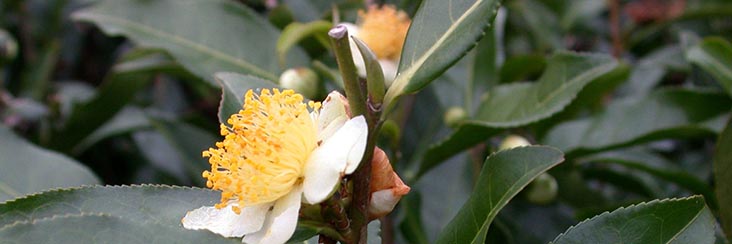
Red Jade Black Tea: Taiwan's Black Tea Specialty
What is called "red tea" (紅茶 / 红茶) in Chinese is known as Black Tea in English. Taiwan has its own special Black Tea named Red Jade Black Tea due to its luminescent reddish-ochre brew. Also known as Taiwan Tea No. 18, Red Jade Black Tea is a hybrid of the Assam tea plant and the wild tea tree that grows naturally in the mountain forests of Taiwan.
Hybrid Creation
This strain of tea was created by the government subsidized Tea Research Extension Station in the Sun Moon Lake tea growing region of Nantou County. Since it possesses the DNA of a wild plant in the local eco-system, it has natural immunity to some of the “pests” that tend to compromise the health of the more conventionally cultivated tea plants. Consequently, this tea type can be cultivated without the use of any chemical fertilizers or pesticides. Our source uses no chemical products in his farming methods.
Special Type of Black Tea
These wild tea qualities, in combination with the Assam tea plant that was originally a native plant to South and Southeast Asia produces an extraordinary type of Black Tea. The processing of Black Tea involves full oxidation of the leaves after being harvested, followed by low-temperature drying without any roasting. Unlike the production Taiwan Oolong Teas, Black Tea is processed without being exposed to high temperatures to cease oxidation or subsequent roasting. Because of this, it maintains more of its natural character – similar to that of dried fruit or nuts. Summer is considered to be the prime harvest time for Black Tea, when the leaves contain the most catechins, providing more flavor and astringency. However, some prominent Black Tea makers are of the conviction that spring harvest makes the most complex flavor profile in the brewed tea.
Family-Run Production
This batch of tea was harvested from a farm that has been managed by a local farmer for well over a decade. In recent years however, our friend who is an organic tea farmer has contracted this farm to cultivate its crop naturally, using no chemical farm products whatsoever. Our friend began with a commitment to procure 1/3 of the seasonal crop, and in less than 3 years has increased his procurement to 2/3, based on demand for his naturally cultivated Red Jade Tea that he processes himself in his home factory. He has had these leaves tested annually with consistent ND results, which indicates zero chemicals in the tea leaves. This new generation with an integrated sustainable approach to tea production is the kind of development in the industry we seek to support.
Our friend lives in the Songbolin tea producing region, and his home factory is equipped for Black Tea processing, which was used by previous generations in his family, but was dormant for many years before this new development. He has repurposed his inherited factory for the production of naturally cultivated Black Tea from a nearby region. He processes his Black Tea himself, using his own factory, which reduces cost and allows him to market it at competitive prices. This also is the kind of sustainable business approach that we are committed to supporting in the local industry.
How to Brew
These leaves are best brewed with slightly below boiling temperature water and with a conservative amount of tea leaves, although the unrolled tea leaves make it look like more in volume than its tightly rolled Oolong cousins. Quick, repeated steepings are ideal for this tea type for maximum fragrance and minimum astringency.
What Do You Think?
Have you tried Red Jade Black Tea? How do you like it? Let us know in the comment section below!
SUBSCRIBE!
If you enjoyed this post and would like to hear more about the specialty tea industry here in Taiwan, follow us on YouTube, Facebook, and Instagram and please subscribe to our newsletter. Subscribe now and get $5 off your first order!




